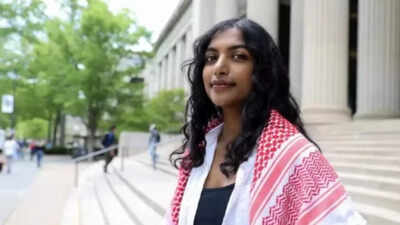ARTICLE AD BOX

MIT’s latest step regarding Megha Vemuri has left the social media and netizens quite ‘speech’less. In a move that has sparked widespread debate over free speech and institutional authority, the Massachusetts Institute of Technology (MIT) barred Vemuri, the Indian-American class president of the Class of 2025, and her family from participating in the university's commencement ceremony.
This decision followed her pro-Palestine speech during the commencement rehearsal, leading to accusations of overreach and censorship.
What happened?
On the eve of the commencement ceremony, Vemuri delivered a speech that apparently deviated from the approved script. In her address, she accused MIT of complicity in what she termed the "genocide" of Palestinians, criticizing the university's research collaborations with Israeli military entities.
Making headlines for her “antisemitic” agendas, she showed solidarity with the Palestinians with her message, a keffiyeh, a symbol of solidarity.Her remarks, which included praise for student protests against Israel and condemnation of MIT's ties with Israeli forces, were met with a mix of boos and cheers from the audience. Jewish students in attendance reportedly walked out in protest.

What followed…
The following morning, MIT Chancellor Melissa Nobles informed Vemuri via email that she and her family were prohibited from attending the graduation ceremony.
The university justified this action by labeling Vemuri's speech as a "staged protest," asserting that she had misrepresented the approved content and disrupted the event's decorum. Consequently, Vemuri was also barred from the campus for most of the day.
How did Vemuri react to her exclusion from the graduation ceremony?
Vemuri publicly criticized MIT's decision, describing it as an overreach and an infringement on her right to free expression. She contested the characterization of her speech as a protest, emphasizing that her remarks were intended to raise awareness about the humanitarian crisis in Gaza.
Her response has garnered support from various quarters, with many viewing the university's actions as an attempt to suppress political discourse on campus.While MIT maintains that its actions were justified to uphold the integrity of the event, the incident raises pertinent questions about the extent to which academic institutions should regulate political expression.
What happens now?
This incident has ignited a broader conversation about the balance between free speech and institutional policies.
Critics argue that MIT's actions set a concerning precedent for the suppression of political expression in academic settings. Supporters of Vemuri contend that universities should serve as platforms for diverse viewpoints and that students should be encouraged to engage with global issues critically.The controversy has also attracted political attention. US House Speaker Mike Johnson condemned Vemuri's speech as "ignorant" and "hateful," suggesting that parents should reconsider sending their children to MIT or other Ivy League institutions.While Harvard is fighting the Trump administration on the international students’ ban, emerging as a strong advocate for academic independence – and in extension – for a democratic environment for students’ opinions, the banning of Megha Vemuri and her family from MIT's graduation ceremony underscores the complexities universities face in navigating free speech and institutional policies.
MIT Grad Wears Arab Headscarf; Torches Alma Mater’s Israel Ties In Viral Speech |Watch



.png)
.png)
.png)
















 1 week ago
14
1 week ago
14










 English (US) ·
English (US) ·